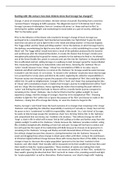Starting with this extract, how does Dickens show that Scrooge has changed?
Change. A sense of renewal to be better, the best version of yourself, flourishing from a seed into
‘summer flowers’ changing to fulfil a purpose. The allegorical novel of ‘A Christmas Carol’ traces
Scrooge’s journey of redemption, from an ‘covetous old sinner’ as ‘sharp and hard as flint’ to
retrieving the ‘golden sunlight’ and maintaining his moral duties as a part of society; utilising his
‘flint’ for the better good.
Prior to the influence of the Ghosts who resulted in Scrooge’s change of heart, Scrooge was
portrayed to be a misanthropist, hard-hearted and unsociable, too ‘tight-fisted’ to give his clerk
more than one piece of coal to light his fire in the ‘bleak and biting weather’ of Victorian England.
The ‘foggy withal’ and the ‘bleak and biting weather’ mirror the darkness in which Scrooge lived in,
the darkness overwhelming the light he once had in his life as a child, establishing his current ‘tight-
fisted’ self. The ‘foggy withal’ would have been a result of the pollution produced by the factories
and workhouses after the Industrial Revolution. It creates the illusion that Scrooge’s insides were
metaphorically polluted by his greed for money, symbolic for the darkness he lived in. He allowed
one of the Seven Deadly Sins, greed, to consume and cast him into the ‘darkness’ as the good within
him is suffocated and lost: setting Scrooge on a pathway to Hell. Scrooge’s greed for money blinded
him, measuring everything by its materialistic value and hence, favouring the ‘darkness’ like an
‘oyster’ would, because it was ‘cheap.’ ‘Cheap’ has connotations of little or no value, easy to
maintain and afford and therefore, to remain in the ‘darkness’ for Scrooge would be easier because
it wouldn’t cost him much. Or so it seems. To remain in the ‘darkness’ would also mean that Scrooge
is to accept that he is truly alone and blind to the world, neglecting his collective responsibilities in
Victorian society and choosing to ignore the purpose of his metaphorical ‘flint’ that could light a fire
within him: his path to enlightenment. Scrooge’s flint is ‘hard’ and ‘sharp’ thus juxtaposing the idea
of ‘cheap’ with connotations of pain. It implies that Scrooge’s journey to enlightenment will be ‘hard’
and not ‘cheap’ like the darkness. Hence signifying the notion that revealing the pearl within his
‘oyster’ and finding the path that leads to Heaven will be a morally harder journey compared to
remaining in the ‘cheap’ ‘darkness,’ due to the fact that to feel the ‘golden sunlight’ he must
experience change. And this change of Scrooge’s heart lies in his metaphorical ‘flint.’ Choosing
whether to light the ‘fire’ within him or ignore the purpose of his ‘flint’ and choose to reside in the
‘darkness,’ closing him off to change like Marley, to ‘wear the chains he forged in life.’
Marley, Scrooge’s ‘sole friend’ knew the harsh outcome of no change; that remaining in the ‘cheap’
‘darkness’ and neglecting his collective responsibility in society isn’t actually so ‘cheap’ but cost him
his peace as he is ‘condemned’ to fulfil his responsibility ‘after death.’ As a ‘sole friend’ of Scrooge,
he wants to help Scrooge escape the ‘ponderous chain’ he is forming ‘link by link’ in the ‘darkness’
and comprehend that not money, but ‘mankind is his business.’ That without change we will all
‘forge’ a chain in life in which will increase ‘link by link’ pulling us further and further away from the
‘golden sunlight’ to settle in the ‘darkness.’ Merely because the ‘darkness’ provides comfort, acting
like a blanket metaphorically shielding us from hurt and pain- Scrooge will not have to endure and
live with pain like the regret of his relationship with Belle because he chooses to be ignorant to it,
remaining in the ‘darkness.' Scrooge and Marley are both demonstrations of those in society who
live without change because they choose to, closing themselves into the ‘darkness’ because its
easier and dragging those whose change is reliant upon others with them. Living in the workhouses
of Victorian England without change because those with money deprive them of the ability to access
change in hope to ‘decrease the surplus population’ ignorant to the fact that ‘mankind is their
business’ and ‘after death’ their morality will be measured not by their wealth but by how they used
their wealth to help the ‘surplus population.’ These members of society are making their chain
longer and longer, ‘link by link’ by ignoring the ‘vast means of usefulness’ of their ‘flint,’ symbolic for
their wealth. Ignoring the idea that their ‘flint’ can be lit to create a fire, providing warmth and light
for ‘surplus population’ as well as themselves. Marley however, was ‘dead to begin with’ implying





